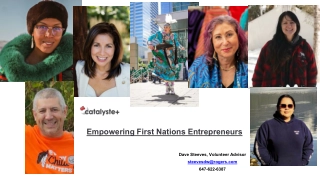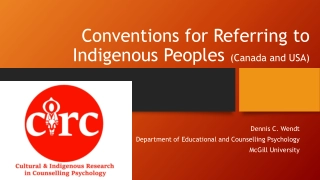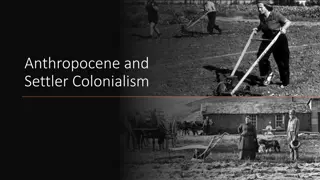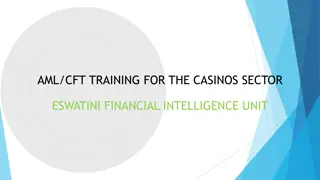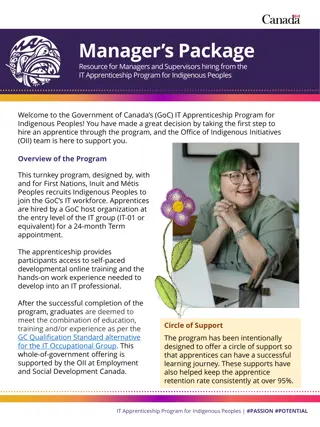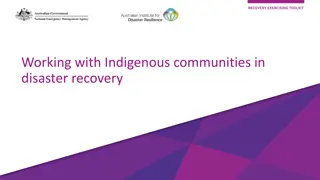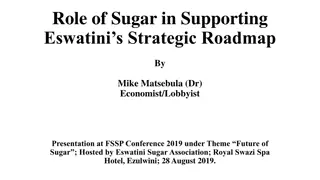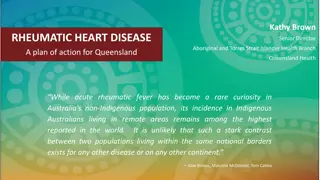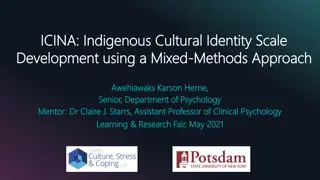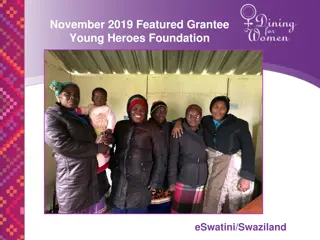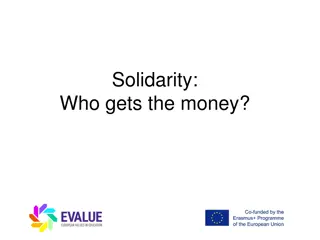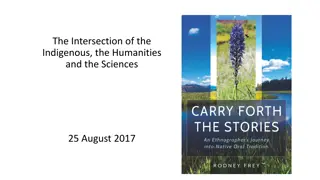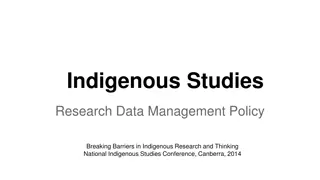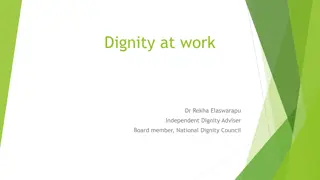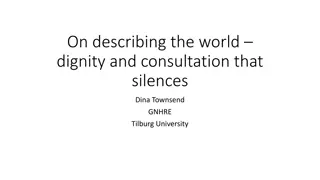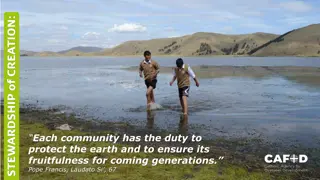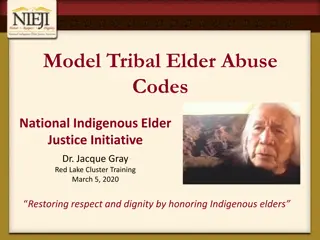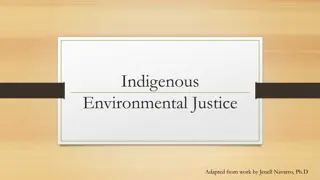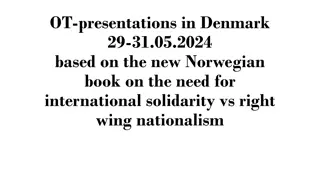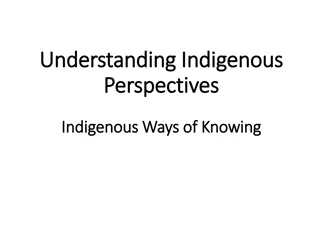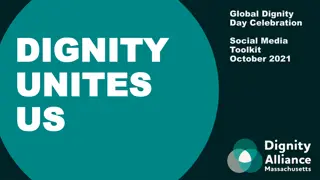Abantu Eswatini Dignity Institute: Integrating Indigenous Knowledge for Global Solidarity
Abantu Eswatini Dignity Institute aims to bridge the gap between academic and indigenous knowledge, fostering solidarity and dignity. Through integrating indigenous knowledge and modernity, it contributes to Eswatini's development, cultural preservation, and global awareness.
Download Presentation

Please find below an Image/Link to download the presentation.
The content on the website is provided AS IS for your information and personal use only. It may not be sold, licensed, or shared on other websites without obtaining consent from the author. Download presentation by click this link. If you encounter any issues during the download, it is possible that the publisher has removed the file from their server.
E N D
Presentation Transcript
Abantu Eswatini Dignity Institute Indigenous Knowledge Hub Dignity Through Solidarity: Towards a New Global Normal Presentation by Joy Ndwandwe Founding President
Introduction Abantu Eswatini Dignity Institute is a Registered NGO N.O. 543 of 2020 Established to Lead the Second Liberation, Knowledge Liberation Dedicated to Bridging a Gap between Academic, Indigenous People s Scientific Knowledge and Ancestral Knowledge Through Integrating Indigenous Knowledge and Modernity
Purpose of AE Dignity Institute Integrating Indigenous Knowledge and Modernity Towards Contributing to Knowledge Economy Towards Contributing to Creative Economy This AEDI is in accordance with Constitution of the Kingdom of Eswatini 2005 The AEDI is in line with the National Development Strategy 2022
Naming AEDI A-Abantu is the Spiritual Identity of Southern Africa predominately known as Bantu AEDI is for Spiritual and Academic Healing, Big Love and Hope Space, Lindner (2020) Bantu the linguistic identity has been a source of humiliation such as Bantu Education, Bantustans, Bantu Administration Transforming Bantu Migration into Abantu Migration
Naming AEDI continued E- the Kingdom renamed by the Patron from Swaziland to Eswatini Decolonizing the Kingdom from Colonial Legacy embedded with Swaziland Linguistic Emancipation as Swaziland is Zulu considering SiSwati is recently developed linguistically EmaSwati have an indigenous context as part of Abantu migration from East and West Africa
Naming AEDI Continued DI Dignity Institute: Responding to statement
Naming AEDI Continued The Above Statement In Formed Global Missionary, Colonial and Apartheid Agenda Systemically Negating Indigenous Knowledge In the context of the Kingdom, complicated as Queen LaZidze was Queen Mother and Queen Regent when Missionaries arrived Her Feminine Power anchored Leadership and Resilience in Preserving Indigenous Knowledge Missionaries and Colonialist suppressed her voice and negated her leadership and indigenous knowledge in 1800 epoch
AEDI Vision Abantu ESwatini Dignity Institute, the Indigenous Knowledge Hub, leading a second liberation dedicated to bridging the gap between academic, indigenous people s scientific and ancestral knowledge through integrating indigenous knowledge and modernity towards contributing to the knowledge and creative economy.
AEDI Mission Abantu ESwatini Dignity Institute (AEDI) Indigenous Knowledge Hub, provides African Renaissance academic research space to advance the Agenda 2030 UN Sustainable Development Goals towards Agenda 2063 Africa, SADC and Eswatini we want. Moreover, towards achieving Education for Sustainable Development (ESD: 2030) to equip learners with knowledge, skills, values and attitudes needed to contribute to a more inclusive, just, peaceful and sustainable world, through knowledge creation, production, disseminating and use of technology for social innovation.
AEDI Objectives To advance the Africa we want, SADC we want, ESwatini we want and UN SDGs To provide academic space in multidisciplinary policy makers and researchers To provide academic space in interdisciplinary policy makers and researchers To provide academic space in transdisciplinarity policy makers and researchers To provide academic space for public policy advocacy and transformation To provide academic space for indigenous knowledges technological innovation
Motivation and Justification Abantu ESwatini Dignity Institute (AEDI) Indigenous Knowledge Hub emanates from the founding president s vision with His Majesty King Mswati III. Hence, the AEDI seeks to provide leadership in a knowledge liberation, embedded within prehistoric, historical and contemporary imperatives systemically negated by missionaries, colonialism and apartheid, including Africans.
AEDI Common Heritage Symbols Sibaya-Kraal Circular Design with 4 Cardinal Points symbolizing Experiential Learning Transforms into Governance, Wholeness, Sacredness Space and the People s Parliament Shield-Symbolizing Sacredness of Cow Hides in Traditional Regalia, War and Peace Regiments Calabash-Symbolizing Wholeness emanating from Mother Earth as Reservoir of Bottomless Indigenous Knowledge
AEDI/ESD Framework Five Priority Action Areas Towards Agenda 2030 and African Union Agenda 2063 Advancing Policy Transforming Learning and Training Environment Developing Capacity of Educators and Trainers Mobilizing Youth Accelerating Sustainable Solutions at Local Level
AEDI/ ESD Specifics & Targets ESD Specific Attention Individual Transformation Societal Transformation Technological Advances ESD Target Groups Policy Makers Institutional Leaders Leaners and Parents Educators Youth and Communities
Abantu Eswatini Dignity Institute Indigenous Knowledge Hub Community and International Schools Engagement Peace, Governance And Democracy Studies Ecology, Environment, Climate Change Studies Education, Law; Abrahamic Religions Including Bahia Indigenous Knowledge Inclusive Development Creative Arts and Industries Wholeness and Sacredness Rules Ethical Leadership, Feminine Power
Proposed Partnerships World Dignity University University of South Africa UNESCO Commission in Eswatini University of Eswatini Royal Science and Technology Park Looking for More Partners for Capacity Building: wasegudu@gmail.com


